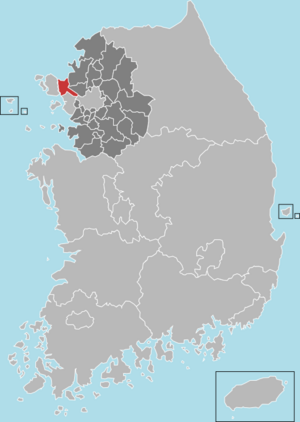Gimpo facts for kids
Quick facts for kids
Gimpo
김포시
|
|||
|---|---|---|---|
| Korean transcription(s) | |||
| • Hangul | 김포시 | ||
| • Hanja | 金浦市 | ||
| • Revised Romanization | Gimpo-si | ||
| • McCune-Reischauer | Kimp'o-si | ||
|
|||

Location in South Korea
|
|||
| Country | |||
| Region | Gyeonggi Province (Sudogwon) | ||
| Administrative divisions | 3 eup, 3 myeon, 7 dong | ||
| Area | |||
| • Total | 276.6 km2 (106.8 sq mi) | ||
| Population
(2019 Mar)
|
|||
| • Total | 427,754 | ||
| • Density | 1,546.55/km2 (4,005.5/sq mi) | ||
| • Dialect | Seoul | ||
Gimpo is a city in Gyeonggi Province, South Korea. It is located next to Incheon and Seoul. The Han River estuary forms part of its border. North Korea is just across the Han River. Gimpo has a population of over 427,000 people.
Gimpo is home to several schools. These include 27 elementary schools, 12 middle schools, and 8 high schools. One notable school is Gimpo Foreign Language High School. The city also has colleges like Kimpo College and Joong-ang Seungga University.
Contents
Gimpo's Past: A Look at Modern History
How Gimpo Grew Over Time
In 1914, two areas called Yangcheon County and Gimpo County joined together. Yangcheon County was then divided into two towns.
Gimpo Airfield's Role in History
The Kimpo Airfield was built in 1939. This was during the time when Japan ruled Korea. The airfield was very important during the Korean War. It changed hands three times during the war. Finally, UN forces took control of it in February 1951. The United States Air Force used it for fighter jets and other planes. These planes often flew into battles in MiG Alley in North Korea.
In 1958, the government decided that this airfield would handle all commercial flights to Seoul. Before this, Yeouido Airport was used. After the new terminal at Gimpo was finished, Yeouido Airport was closed.
Changes to Gimpo's Borders
In 1963, some towns, including the area with Gimpo International Airport, became part of Yeongdeungpo-gu in Seoul. Later, in 1973, some towns from Bucheon were moved to Gimpo. In 1989, parts of Gyeyang town were given to Incheon. This gave Incheon a border with southwestern Seoul. More land, the Geomdan area, was transferred to Incheon in 1995.
Gimpo Becomes a City
In 1998, Gimpo officially became a city. A big new development called the Gimpo Han River New Town was announced in 2003. This project has greatly increased the city's population. To help with transportation, a new light rail system, the Gimpo Goldline, opened in 2019. This train connects the New Town to Gimpo International Airport station. From there, people can easily transfer to other train lines.
Gimpo's Weather and Climate
Gimpo has a climate with four clear seasons. It has cold, dry winters and hot, rainy summers. This type of climate is called a monsoon-influenced humid continental climate.
| Climate data for Gimpo (2004–2020 normals) | |||||||||||||
|---|---|---|---|---|---|---|---|---|---|---|---|---|---|
| Month | Jan | Feb | Mar | Apr | May | Jun | Jul | Aug | Sep | Oct | Nov | Dec | Year |
| Mean daily maximum °C (°F) | 1.3 (34.3) |
4.6 (40.3) |
10.5 (50.9) |
16.8 (62.2) |
22.8 (73.0) |
27.0 (80.6) |
28.6 (83.5) |
30.0 (86.0) |
25.8 (78.4) |
19.9 (67.8) |
11.5 (52.7) |
3.0 (37.4) |
16.8 (62.2) |
| Daily mean °C (°F) | −3.5 (25.7) |
−0.5 (31.1) |
5.1 (41.2) |
11.2 (52.2) |
17.2 (63.0) |
21.9 (71.4) |
24.7 (76.5) |
25.7 (78.3) |
20.8 (69.4) |
14.2 (57.6) |
6.8 (44.2) |
−1.3 (29.7) |
11.9 (53.4) |
| Mean daily minimum °C (°F) | −7.8 (18.0) |
−5.1 (22.8) |
0.3 (32.5) |
6.3 (43.3) |
12.5 (54.5) |
17.9 (64.2) |
21.8 (71.2) |
22.4 (72.3) |
16.8 (62.2) |
9.5 (49.1) |
2.3 (36.1) |
−5.5 (22.1) |
7.6 (45.7) |
| Average precipitation mm (inches) | 7.4 (0.29) |
21.7 (0.85) |
30.5 (1.20) |
60.1 (2.37) |
90.3 (3.56) |
100.1 (3.94) |
362.3 (14.26) |
245.0 (9.65) |
139.1 (5.48) |
39.0 (1.54) |
47.6 (1.87) |
17.4 (0.69) |
1,160.5 (45.69) |
| Average precipitation days (≥ 0.1 mm) | 2.5 | 2.7 | 4.5 | 7.1 | 6.1 | 7.2 | 13.2 | 10.5 | 7.0 | 4.5 | 6.8 | 4.4 | 76.5 |
| Source: Korea Meteorological Administration | |||||||||||||
Fun Places to Visit in Gimpo
Gimpo has many interesting places to explore. Here are some of them:
- Munsu Fortress: An old fortress with a lot of history.
- Jangneung: A royal tomb that is a peaceful place to visit.
- Deokpojin: Another historic site, often related to military history.
- Aegi Peak: Offers great views, especially of the Han River.
- Daemyeong Port: A lively port where you can see fishing boats.
- DMZ Peace Trail: A special trail near the border, offering unique insights.
- Czong Institute for Contemporary Art (CICA Museum): A museum for modern art.
Sister Cities Around the World
Gimpo has special connections with other cities and counties. These are called sister cities. They work together to share culture and ideas.
 Glendale, California, United States
Glendale, California, United States Hampyeong, South Jeolla, South Korea
Hampyeong, South Jeolla, South Korea Xinmin, Liaoning, China
Xinmin, Liaoning, China Heze, Shandong, China
Heze, Shandong, China Bacong, Negros Oriental, Philippines
Bacong, Negros Oriental, Philippines
Images for kids
See also
 In Spanish: Gimpo para niños
In Spanish: Gimpo para niños
 | Dorothy Vaughan |
 | Charles Henry Turner |
 | Hildrus Poindexter |
 | Henry Cecil McBay |




